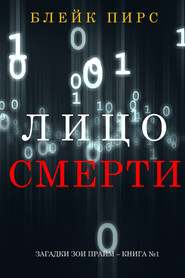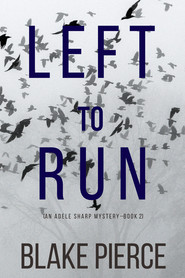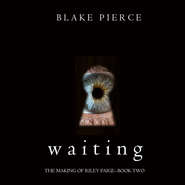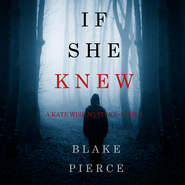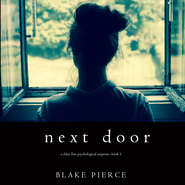По всем вопросам обращайтесь на: info@litportal.ru
(©) 2003-2024.
✖
Face of Murder
Настройки чтения
Размер шрифта
Высота строк
Поля
There was a pause on the other end, before Dr. Applewhite spoke again, softer and soothingly. “Zoe, I know it must be difficult to take in. I understand that you wanted the equations to mean something. The thing is, they simply don’t.”
“I hear you,” Zoe said. It was the only truth she could offer just then. “Thank you for going to all of this trouble for me.”
Dr. Applewhite was making overtures of kindness, suggesting that she would do anything Zoe needed, but Zoe had already begun to tune her out. She was looking at the blown-up photographs of the equations, printed in a scrawling hand across the torsos of two dead men.
“I will talk to you again soon,” she said, hanging up the call. She did not have enough presence of mind to know whether Dr. Applewhite had been in mid-sentence when she interrupted.
“Is it bad news?” Shelley asked, quietly.
Zoe had almost forgotten she was in the room. “My contact, for the math professors. They do not feel that there is any lead in the equations. Apparently, they are impossible to solve. The word used was ‘gibberish.’”
Shelley took a breath, blew out a whistle. “Wow. Are we sure about that?”
Zoe searched within herself, trying to find the answer. Did she really believe it? “I do not know,” she said, at last. “It does not feel right. I thought these equations were the key to solving it all. I—I still do. How can they be meaningless?”
Shelley circled their desks to stand next to Zoe, looking down at the pictures. She patted Zoe’s hand lightly, then tapped one of the images. “They aren’t meaningless. Not to us. Even if the equations have no solution, these were written by our perpetrator. That means they have a lot of clues for us. State of mind, handwriting, even the pen he used. That’s forensic evidence. We can still use these to put him behind bars.”
“Or her,” Zoe said automatically, though it was true that the physical evidence suggested the strength of a male. Still, she had been caught out by that once in the past. A woman who had trained as a wrestler, the musculature on her arms far above that of the average female—or male, for that matter. Her strength had been enough to snuff out a life without need for any tools other than her own body.
“All hope is not lost, is what I’m saying.”
Zoe continued to stare down at the images. If Dr. Applewhite was right, Zoe had just wasted some of the most crucial hours of the case fixating on something that meant nothing. And she had been so sure. Could this really be meaningless? Really?
“You aren’t the only one who had trouble sleeping,” Shelley said, giving Zoe a sympathetic smile. Zoe briefly wondered how Shelley could tell, but then, she hadn’t looked in a mirror that morning. The bags under her eyes were probably deeper and darker than ever. “I spent a few hours searching online. Take a look at these.”
She had a sheath of papers that she was distributing across the desk, covering over the crime scene photographs. Zoe wanted to protest, but she held herself back. She would sound petty. Like she couldn’t let the equation theory go.
She didn’t want to let it go, but that was beside the point. When people wanted her to forget something, and she didn’t, there were often arguments and interventions set to follow. Zoe didn’t want that. She could at least pretend she was getting over it, in front of others.
“These two are from local papers, and those are from scientific journals,” Shelley was explaining, pointing at the various printouts. Each of them bore a photograph of the same man, some from different angles; the headlines were all inflammatory. “See here? Professor loses post over controversy. It sounds like this guy got into a pretty public showdown. He was a fairly well-respected theoretical physicist, until he got into an argument with another professor. Things escalated, words turned to blows. The police intervened, and it turns out our guy was drunk on the job. He lost his position, and his reputation hit the rocks. Students and colleagues started coming out of the woodwork, accusing him of inappropriate conduct because of his alcoholism.”
“And he was teaching here?” Zoe asked, nodding as she followed the story. It was a convincing picture. A man with an ax to grind.
“Yes. And here’s the best part.” Shelley paused, flashing Zoe a smile. “Guess who the other professor was.”
Zoe’s eyes had already picked out the name in the text as she scanned it. “Professor Ralph Henderson. Our second victim.”
“Bingo,” Shelley said, grabbing the papers back into a pile and shoving them into her bag. “I have his home address. Reportedly, he hasn’t been able to get work for the past few months since this happened, so I imagine we will find him there.”
“Then we should go,” Zoe said, heading for the door herself. She did not need to turn around to know that Shelley would be right behind her.
Even if nothing else was panning out the way that she wanted it to, a solved case was a solved case. If this ex-professor was behind it all, it would be disappointing—but there would be a killer taken off the streets before any more lives were lost.
That, Zoe reminded herself as they headed for the parking garage, was what really mattered.
Even so, she couldn’t shake that niggling doubt at the back of her min, that this case wasn’t going to be wrapped up so easily.
CHAPTER TWELVE
Zoe drove as Shelley worked from her laptop, hooked up to a Wi-Fi dongle. It was the most efficient way to both look up their new suspect and reach him as quickly as possible.
Zoe conceded that there was a lot to like about James Wardenford, as far as suspects went. Shelley read seven newspaper clippings to her as they drove: each told the story of a man who was used to respect, to recognition, and to a good reputation. He had lost all of it. Stronger men would have struggled to cope.
But an alcoholic?
For him, it must have sent him off the rails.
That would neatly tie a few things up. Zoe started to feel more excited about the idea, the closer they got to his home. As a theoretical physicist he would have been no stranger to complex math equations, but as a perpetual drunkard, he might have lost his ability to express them properly. Maybe he thought that what he was writing made perfect sense.
There was a little disconnect between the idea of someone so drunk they could not write correctly, yet sober enough to kill a man and leave so little evidence they had so far gotten away with it. But that was a detail Zoe was willing to let slide until they had actually spoken to him. Functioning alcoholism meant different things for different people.
They pulled up outside an apartment block, with small yet neatly maintained units clearly visible from the ground. The balconies outside each set of French doors held rose bushes in pots, bicycles, small outdoor table and chair sets. It was a nice place. The kind of building you might retire to on a modest yet comfortable pension.
The kind of place a once-well-paid professor and physicist might retreat to once his paychecks weren’t so guaranteed anymore.
Apartment buildings were often a little tricky. When someone came to the front door of a house and saw the police there, they had no choice but to talk. Ringing an intercom and asking for entry meant that it could be denied.
Zoe looked up as they walked toward the front door, taking in the windows that she could see. One set of French doors was open, the curtain blowing slightly in the breeze. She made a quick calculation: third floor, fourth door along. If the building was numbered in a logical way from the left front corner, she could get them in a little easier.
She pressed three-zero-four on the intercom panel, and waited for it to connect.
Shelley was checking her notes, no doubt remembering that James Wardenford was not in fact an inhabitant of 304, but before she could protest, the call connected.
“Hello?”
“Hello, ma’am. I have a delivery.”
Zoe caught Shelley’s eye, shrugged, and looked back at the intercom.
“Sure, come in.”
The entrance door buzzed and clicked, indicating that it had been unlocked. Zoe pushed through and started up the stairs, heading for the apartment that really did belong to their suspect.
“What are we delivering?” Shelley asked, a little primly. Rookie agents were always sticklers for the rules. Except for the ones that weren’t, and ended their careers quickly. She would learn to loosen up over time.
“Justice,” Zoe said, after some thought.
Shelley’s peals of laughter burst through the narrow staircase, echoing from the walls. “I like that,” she said, once the worst of her mirth had subsided.
The apartment was on the second floor, at the opposite side of the building from where they had come in. Zoe thought it a shame they hadn’t had more opportunity to gain some clues as to Wardenford’s state of mind from the exterior, but you made do with what you had. The lock on his apartment door was surrounded by scrape marks, an early clue to a habitual drunk. He missed the keyhole often, unable to see it clearly.
Zoe rapped sharply on the door as Shelley joined her, just slightly out of breath from the climb.
There was a rolling, crashing noise from within, then a few unsteady, heavy footsteps. “Jus’a minute,” a male voice slurred.
“Bet he’s real popular with the downstairs neighbors,” Shelley muttered.
Zoe simply waited. Her patience was rewarded. James Wardenford cracked open his door without bothering to engage the safety chain, leaning on the walls of his own corridor for support as he eyed them with a squint.
“I hear you,” Zoe said. It was the only truth she could offer just then. “Thank you for going to all of this trouble for me.”
Dr. Applewhite was making overtures of kindness, suggesting that she would do anything Zoe needed, but Zoe had already begun to tune her out. She was looking at the blown-up photographs of the equations, printed in a scrawling hand across the torsos of two dead men.
“I will talk to you again soon,” she said, hanging up the call. She did not have enough presence of mind to know whether Dr. Applewhite had been in mid-sentence when she interrupted.
“Is it bad news?” Shelley asked, quietly.
Zoe had almost forgotten she was in the room. “My contact, for the math professors. They do not feel that there is any lead in the equations. Apparently, they are impossible to solve. The word used was ‘gibberish.’”
Shelley took a breath, blew out a whistle. “Wow. Are we sure about that?”
Zoe searched within herself, trying to find the answer. Did she really believe it? “I do not know,” she said, at last. “It does not feel right. I thought these equations were the key to solving it all. I—I still do. How can they be meaningless?”
Shelley circled their desks to stand next to Zoe, looking down at the pictures. She patted Zoe’s hand lightly, then tapped one of the images. “They aren’t meaningless. Not to us. Even if the equations have no solution, these were written by our perpetrator. That means they have a lot of clues for us. State of mind, handwriting, even the pen he used. That’s forensic evidence. We can still use these to put him behind bars.”
“Or her,” Zoe said automatically, though it was true that the physical evidence suggested the strength of a male. Still, she had been caught out by that once in the past. A woman who had trained as a wrestler, the musculature on her arms far above that of the average female—or male, for that matter. Her strength had been enough to snuff out a life without need for any tools other than her own body.
“All hope is not lost, is what I’m saying.”
Zoe continued to stare down at the images. If Dr. Applewhite was right, Zoe had just wasted some of the most crucial hours of the case fixating on something that meant nothing. And she had been so sure. Could this really be meaningless? Really?
“You aren’t the only one who had trouble sleeping,” Shelley said, giving Zoe a sympathetic smile. Zoe briefly wondered how Shelley could tell, but then, she hadn’t looked in a mirror that morning. The bags under her eyes were probably deeper and darker than ever. “I spent a few hours searching online. Take a look at these.”
She had a sheath of papers that she was distributing across the desk, covering over the crime scene photographs. Zoe wanted to protest, but she held herself back. She would sound petty. Like she couldn’t let the equation theory go.
She didn’t want to let it go, but that was beside the point. When people wanted her to forget something, and she didn’t, there were often arguments and interventions set to follow. Zoe didn’t want that. She could at least pretend she was getting over it, in front of others.
“These two are from local papers, and those are from scientific journals,” Shelley was explaining, pointing at the various printouts. Each of them bore a photograph of the same man, some from different angles; the headlines were all inflammatory. “See here? Professor loses post over controversy. It sounds like this guy got into a pretty public showdown. He was a fairly well-respected theoretical physicist, until he got into an argument with another professor. Things escalated, words turned to blows. The police intervened, and it turns out our guy was drunk on the job. He lost his position, and his reputation hit the rocks. Students and colleagues started coming out of the woodwork, accusing him of inappropriate conduct because of his alcoholism.”
“And he was teaching here?” Zoe asked, nodding as she followed the story. It was a convincing picture. A man with an ax to grind.
“Yes. And here’s the best part.” Shelley paused, flashing Zoe a smile. “Guess who the other professor was.”
Zoe’s eyes had already picked out the name in the text as she scanned it. “Professor Ralph Henderson. Our second victim.”
“Bingo,” Shelley said, grabbing the papers back into a pile and shoving them into her bag. “I have his home address. Reportedly, he hasn’t been able to get work for the past few months since this happened, so I imagine we will find him there.”
“Then we should go,” Zoe said, heading for the door herself. She did not need to turn around to know that Shelley would be right behind her.
Even if nothing else was panning out the way that she wanted it to, a solved case was a solved case. If this ex-professor was behind it all, it would be disappointing—but there would be a killer taken off the streets before any more lives were lost.
That, Zoe reminded herself as they headed for the parking garage, was what really mattered.
Even so, she couldn’t shake that niggling doubt at the back of her min, that this case wasn’t going to be wrapped up so easily.
CHAPTER TWELVE
Zoe drove as Shelley worked from her laptop, hooked up to a Wi-Fi dongle. It was the most efficient way to both look up their new suspect and reach him as quickly as possible.
Zoe conceded that there was a lot to like about James Wardenford, as far as suspects went. Shelley read seven newspaper clippings to her as they drove: each told the story of a man who was used to respect, to recognition, and to a good reputation. He had lost all of it. Stronger men would have struggled to cope.
But an alcoholic?
For him, it must have sent him off the rails.
That would neatly tie a few things up. Zoe started to feel more excited about the idea, the closer they got to his home. As a theoretical physicist he would have been no stranger to complex math equations, but as a perpetual drunkard, he might have lost his ability to express them properly. Maybe he thought that what he was writing made perfect sense.
There was a little disconnect between the idea of someone so drunk they could not write correctly, yet sober enough to kill a man and leave so little evidence they had so far gotten away with it. But that was a detail Zoe was willing to let slide until they had actually spoken to him. Functioning alcoholism meant different things for different people.
They pulled up outside an apartment block, with small yet neatly maintained units clearly visible from the ground. The balconies outside each set of French doors held rose bushes in pots, bicycles, small outdoor table and chair sets. It was a nice place. The kind of building you might retire to on a modest yet comfortable pension.
The kind of place a once-well-paid professor and physicist might retreat to once his paychecks weren’t so guaranteed anymore.
Apartment buildings were often a little tricky. When someone came to the front door of a house and saw the police there, they had no choice but to talk. Ringing an intercom and asking for entry meant that it could be denied.
Zoe looked up as they walked toward the front door, taking in the windows that she could see. One set of French doors was open, the curtain blowing slightly in the breeze. She made a quick calculation: third floor, fourth door along. If the building was numbered in a logical way from the left front corner, she could get them in a little easier.
She pressed three-zero-four on the intercom panel, and waited for it to connect.
Shelley was checking her notes, no doubt remembering that James Wardenford was not in fact an inhabitant of 304, but before she could protest, the call connected.
“Hello?”
“Hello, ma’am. I have a delivery.”
Zoe caught Shelley’s eye, shrugged, and looked back at the intercom.
“Sure, come in.”
The entrance door buzzed and clicked, indicating that it had been unlocked. Zoe pushed through and started up the stairs, heading for the apartment that really did belong to their suspect.
“What are we delivering?” Shelley asked, a little primly. Rookie agents were always sticklers for the rules. Except for the ones that weren’t, and ended their careers quickly. She would learn to loosen up over time.
“Justice,” Zoe said, after some thought.
Shelley’s peals of laughter burst through the narrow staircase, echoing from the walls. “I like that,” she said, once the worst of her mirth had subsided.
The apartment was on the second floor, at the opposite side of the building from where they had come in. Zoe thought it a shame they hadn’t had more opportunity to gain some clues as to Wardenford’s state of mind from the exterior, but you made do with what you had. The lock on his apartment door was surrounded by scrape marks, an early clue to a habitual drunk. He missed the keyhole often, unable to see it clearly.
Zoe rapped sharply on the door as Shelley joined her, just slightly out of breath from the climb.
There was a rolling, crashing noise from within, then a few unsteady, heavy footsteps. “Jus’a minute,” a male voice slurred.
“Bet he’s real popular with the downstairs neighbors,” Shelley muttered.
Zoe simply waited. Her patience was rewarded. James Wardenford cracked open his door without bothering to engage the safety chain, leaning on the walls of his own corridor for support as he eyed them with a squint.









